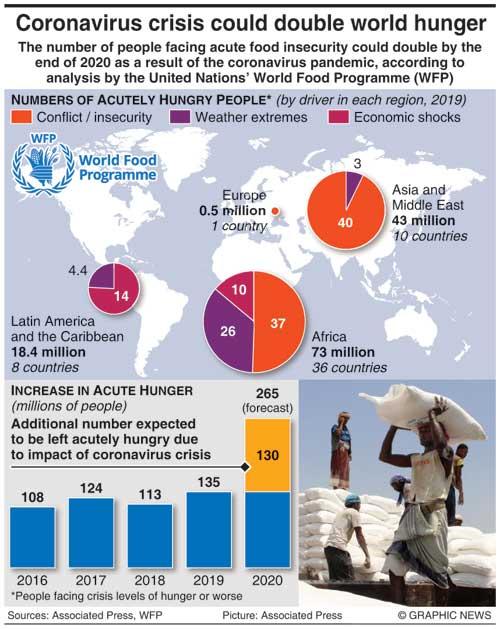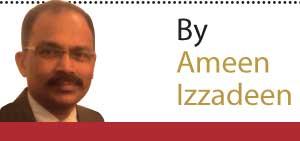Reply To:
Name - Reply Comment
The global war against Covid-19 can be, in a sense, described as World War III. Many believed that World War III  would see a nuclear war, but before such a nuclear holocaust could happen, the world is now experiencing a calamity of world war or slow nuclear war proportions.
would see a nuclear war, but before such a nuclear holocaust could happen, the world is now experiencing a calamity of world war or slow nuclear war proportions.
In the global war against the new coronavirus, nuclear weapons appear to be damp squibs. Even the world’s most powerful nations are powerless and confused as to how to defeat the invisible enemy.
Just as in a world war, in the Covid war, too, thousands die daily while the crisis is also having a devastating impact on the economy of every nation regardless of its economic standing. As the crisis prolongs, millions lose their jobs or sources of income. Signs of a global famine are already visible. The United Nations has warned of it.
World War I led to the infamous recession of 1920 and World War II warranted a Marshal Plan and large scale financial injections to resuscitate the economies of war-ravaged European nations. The two wars also saw paradigm shifts in the international systems, upending the global order that existed before the wars.
Will we see a new world order in the aftermath of the Covid war? World history shows that after every cataclysmic event or war, there was a tendency to make amends – a kind of course correction. In the 17th century, the Thirty-Year War that devastated Europe or Christendom ended in the Treaty of Westphalia in 1648 and in its wake brought about a nation-state-based world order that respected national sovereignty and international law. But, by the dawn of the 20th century, the somewhat idealist world order had been all but dead.
Economic competition, militarism and imperialistic agendas had created the ground for a major war, for which the trigger became the assassination of Archduke Franz Ferdinand in Serbia in 1914. The four-year war in which 17 million people died gave birth to the post-WWI utopic international order, once again based on international law with the ultimate aim being world peace and conflict resolution through the mechanism of the newly set up League of Nations.
But this idealistic world order or perpetual peace as propounded by the 18th century German philosopher Emmanuel Kant could not prevent the outbreak of World War II, although the post-WWI United States President Woodrow Wilson pushed it to the hilt. Its failure to prevent WWII came under severe criticism from political realists such as E.H. Carr.
 Carr demonstrated how well-conceived ideas of peace and cooperation among states were undermined by the realities of chaos and insecurity in the international realm. He criticised the proponent of political idealism for overlooking the importance of power in politics and failing to consider the exigencies of survival and the competitive nature of international politics. While idealists focused on human welfare and dreamt of a world government, Nazi Germany pursued power-centric politics and dreamt of becoming the world’s only power. This idealist world order which neglected the importance of the balance of power led to World War II.
Carr demonstrated how well-conceived ideas of peace and cooperation among states were undermined by the realities of chaos and insecurity in the international realm. He criticised the proponent of political idealism for overlooking the importance of power in politics and failing to consider the exigencies of survival and the competitive nature of international politics. While idealists focused on human welfare and dreamt of a world government, Nazi Germany pursued power-centric politics and dreamt of becoming the world’s only power. This idealist world order which neglected the importance of the balance of power led to World War II.
Then emerged another world order from the ruins of World War II in which more than 70 million people died. This world order saw nations using idealism judiciously to achieve their power-centric goals.
The United Nations was established but it is controlled by a handful of nations with veto powers. Peace became a pawn in post-WWII power politics that first saw a suspicion-ridden bipolar world order and the Cold War. Then there emerged a loose bipolar world order with the Non-Aligned Movement charting a middle path. Then with the demise of the Soviet Union, one of the protagonists of the bipolar international system, there emerged a unipolar system and eventually a multipolar system in the wake of China’s rise as a superpower.
Now will this multipolar system where the global power the US has been wielding since the end of WWII is being challenged by the rise of China and assertive international politics of Russia, transform into a new world order after the Corona crisis is over?
Even an ardent political realist like Henry Kissinger now realises that it is time for a New World Order, for no country can conquer an enemy like the SARS-Cov-2 virus single handedly. Kissinger was a great advocate of a balance of power world order that has enabled the United States to maintain the world’s number one status since the end of World War II.
In a recent op-ed article he wrote for the Wall Street Journal, he says: “Leaders are dealing with the crisis on a largely national basis, but the virus’s society-dissolving effects do not recognize borders. While the assault on human health will—hopefully—be temporary, the political and economic upheaval it has unleashed could last for generations. No country, not even the U.S., can in a purely national effort overcome the virus. Addressing the necessities of the moment must ultimately be coupled with a global collaborative vision and program. If we cannot do both in tandem, we will face the worst of each.”
Kissinger’s article, however, has drawn global criticism, for the new world order he was seeking to establish is, in fact, an attempt to re-establish the US-led world order or a subtle attempt to prevent China from rising as the dominant world power. But the multibillion dollar question is: Is the US qualified to give leadership to this post-corona world order where there will be no wars, no dirty arms deals, no unscrupulous activities or plunder of poor nations’ resources by rich nations.
Definitely, it cannot and will not happen under the presidency of Donald Trump, who want to stop hundreds of millions of dollars in aid to the World Health Organisation, the premier international agency coordinating battle plans to defeat the new coronavirus and other deadly diseases. Despite the growing agreement that collective global efforts and continuous international cooperation are needed to overcome future viruses, the shape of the post-coronavirus world order is likely to be far from a rules based system promoting peace and justice. Disturbing signs are emerging that the post-corona world order will be violent and acrimonious, with nations engaging in aggressive competition to build up their corona-ravaged economies while forgetting the unity message the Covid crisis tried to rub it in. One such disturbing sign is an attempt to take China before the world court to answer charges that it failed to take early action to prevent the global spread of the coronavirus.
While the Covid crisis teaches us that humanity is one and we need to work together to find a vaccine for the deadly disease and build a healthy society in every country, self-centred power politics at play points to the reality that Utopia is still far off.